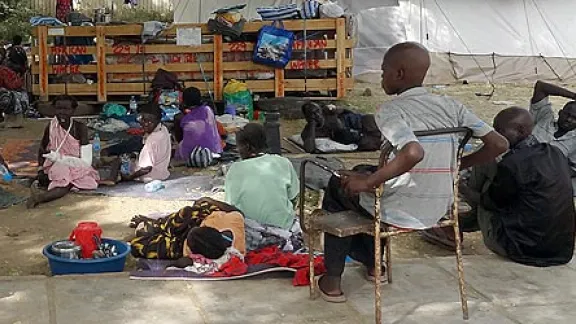
The LWF is providing food, water, blankets and other assistance to victims of the recent inter-ethnic attacks in Jonglei State, like these wounded taking shelter outside an overcrowded Juba hospital. © LWF
Some Pastoralists Have Lost Everything
The Lutheran World Federation (LWF) is delivering humanitarian assistance to thousands of people displaced in inter-ethnic fighting in Jonglei State in South Sudan.
Since the start of the latest round of violence on 23 December, the LWF has been working with United Nations teams and other ACT Alliance members Norwegian Church Aid and the Sudan Council of Churches to launch a coordinated response to help the nearly 30,000 people displaced by the crisis.
"It is extremely difficult to reach these people as there are virtually no roads or airstrips. They will be lacking even in the most basic supplies and services," said Arie Den Toom, the LWF South Sudan country representative.
Fighting broke out two weeks ago in Jonglei after armed men from the Lou-Nuer community attacked Pibor County, the homeland of the Murle community. Hundreds of cattle were stolen, houses burnt and women and children abducted.
With the ensuing displacement and the death of hundreds, the government declared Jonglei a disaster zone. It has also appealed to international relief agencies to provide humanitarian assistance to the affected populations.
Before the latest attacks, the UN had estimated that nearly 1,000 people had been killed in such violence during the past seven months.
The LWF programs in Jonglei focus on peace-building, water and sanitation, education and food security. According to Den Toom, the LWF will deliver 200 kits of non-food items. Medical supplies are also being provided to a hospital in Juba for the injured who have moved to the city seeking treatment. An emergency base being set up in Pibor will include two portable shelters for the storage of relief supplies.
Trucks have been dispatched from Ikoto town in Eastern Equatoria State to Bor to help with the transportation of relief aid. This assistance will benefit some of the pastoralists who had lost everything in the attacks and who are said to be slowly returning to Pibor.
There are concerns about revenge attacks including in the Lou Nuer regions, where the LWF carries out community-based work. "This is of great concern to me," said Den Toom. "We urge the authorities to continue their efforts to guarantee security in the area and help the populations affected by the fighting to resume their normal lives." According to the LWF official, the conflict is also attributed to the fact that the Murle feel they have been excluded from aid and development support in the last few years. While food and shelter are immediate priorities, "part of the long-term conflict resolution process is to make the Murle feel less marginalized," Den Toom added.
In Jonglei, communities traditionally raided each other's cattle, but in recent years, small arms left behind by decades of civil war have militarized the pastoralist groups, turning the decades-long tradition into a deadly one.
Meanwhile, the LWF is closely monitoring an increased influx of refugees from South Sudan to Kakuma camp in Kenya. On 9 January alone, 150 refugees arrived from South Sudan, including a high number of youth and children. The camp, which the LWF manages for the UN High Commissioner for Refugees (UNHCR), is located some 90 kilometers from the northwestern border with Sudan and receives between 70 and 150 refugees per week.
According to UNHCR data, the camp is currently home to more than 85,000 refugees from 11 African countries. The population comprises over 45,000 Somalis, while Sudanese nationals account for around 30 percent of the total. Large-scale repatriations to South Sudan have been possible since the 2005 peace accord ending over two decades of civil war, and more recently the process leading to the separation of the South from the North and the subsequent establishment of the Republic of South Sudan in July 2011.
(638 words) (By LWI correspondent Fredrick Nzwili)


